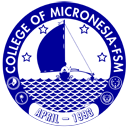500K PACAM Grant for the College
 Colonia, Yap (September 15, 2014) - The Pacific-American Climate Fund (PACAM) of the U.S. Agency for International Development (USAID) has announced the first set of successful applications for PACAM grants.
Colonia, Yap (September 15, 2014) - The Pacific-American Climate Fund (PACAM) of the U.S. Agency for International Development (USAID) has announced the first set of successful applications for PACAM grants.
The College of Micronesia-FSM is one of nine civil society organizations (CSOs) that were successful in their grant applications for the “Project on Climate Resilient Adaptation and Mainstreaming (Project CREAM). In a letter to the college, PACAM Chief of Party, Mr. Harry Wheeler congratulated President Dr. Joseph M. Daisy for submitting the application on behalf of the College.
The project was written and submitted by Dr. Murukesan Krishnapillai, Researcher/Extension Specialist of Cooperative Research and Extension at Yap Campus. The long-term goal of this project is to enhance the resilience of island communities in the FSM to climate change.
The formal announcement was made on September 1, 2014 at a reception at the Tanoa Tusitala Hotel in Apia, Samoa as a side event of the 2014 UN Conference on Small Island Developing States.
The award of the PACAM Grant is conditional on the completion of a 2 phase pre-award survey to determine whether the recipient has the necessary organization, experience, accounting and operational controls, and the technical skills to achieve the objectives, as well as negotiations to finalize the budget and other matters related to the proposed project. A two-member team will be visiting Yap soon to conduct the pre-award survey.
The five-year, $24-million PACAM grant facility, funded by USAID, provides grants to qualifying CSOs for the implementation of innovative climate change adaptation measures in twelve countries in the Pacific: Federated States of Micronesia (FSM), Fiji, Kiribati, Nauru, Palau, Papua New Guinea, Republic of Marshall Islands (RMI), Samoa, Solomon Islands, Tonga, Tuvalu, and Vanuatu.
The grantee selection process began with the submission of project concept papers from interested CSOs to the PACAM Administrative Office. CSOs with promising concept papers were then invited to develop these into full proposals, which underwent stringent review.
